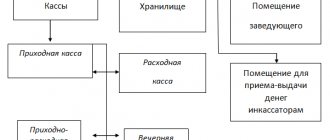Law No. 82-FZ on the abolition of the use of seals
- Requirements for the seal of an organization (IP)
- What should the seal of the organization and individual entrepreneur contain?
- Law abolishing the use of organization seals
- useful links
This article is written as part of a step-by-step guide to registering a business yourself:
- How to register an individual entrepreneur (PBLE) and an LLC with the tax office yourself
- Preparation and execution of necessary documents for registration.
- Registration of an LLC (CJSC, OJSC) or individual entrepreneur with the tax office
- When is it not necessary to register an individual entrepreneur?
- Registration of LLC (CJSC, JSC) or individual entrepreneur in the Pension Fund of the Russian Federation, Compulsory Medical Insurance Fund, Social Insurance Fund, Rosstat)
- Making a seal.
- Opening a current account in a bank.
- Registration of changes in the charter, constituent documents, Unified State Register of Legal Entities
- Change of director and amendments to the Unified State Register of Legal Entities on his passport data
- Reorganization of a legal entity
- Methods for liquidating an organization
Requirements for the seal of an organization (IP)
You have already received a certificate of state registration of an LLC (CJSC, JSC) or individual entrepreneur and (if necessary) registered a new business unit with Rosstat and extra-budgetary funds.
The Civil Code of the Russian Federation (Civil Code) does not contain requirements for the obligation of individual entrepreneurs and legal entities to have a seal, therefore the provisions of the Civil Code do not establish the procedure for the production, use, and replacement of seals.
At the same time, the laws “On Joint Stock Companies” and “On Limited Liability Companies” establish the obligation for these organizational and legal forms of organizations to have a seal.
In accordance with paragraph 5 of Article 2 of the Federal Law of 02/08/1998 No. 14-FZ “On Limited Liability Companies,” an LLC must have a round seal containing its full corporate name in Russian and an indication of the location of the company. The company's seal may also contain the company's corporate name in any language of the peoples of the Russian Federation and (or) a foreign language.
Similar norms are established in paragraph 7 of Article 2 of the Law of December 26, 1995 No. 208-FZ “On Joint-Stock Companies”).
Additional seals of the organization must (in addition to general details) include appropriate inscriptions (“HR department”, “archive”, for invoices, “for invoices”, “office”, etc.).
Currently, an organization does not have to obtain any permits or notify any authority to produce a seal.
Previously, in some regions there were rules for the production and registration of seals. For example, in Moscow until 2002 there was a procedure for mandatory registration of seals when creating a legal entity. When registering a legal entity, approval of a seal sketch was required at the Moscow Registration Chamber (Order of the Moscow Mayor dated August 25, 1998 No. 843-RM).
Currently, registration is carried out by tax authorities in accordance with Federal Law dated 08.08.2001 No. 129-FZ “On State Registration of Legal Entities and Individual Entrepreneurs”.
This Law does not contain norms that oblige the registration of the seal of a legal entity and individual entrepreneur, therefore, neither when registering an individual entrepreneur, nor when registering organizations is it necessary to submit to the tax office either a sketch of the organization’s seal or other information about it.
Therefore, issues related to the manufacture, replacement, and destruction of the seal are resolved by the organization and the entrepreneur independently.
Seal protection
Manufacturers offer various ways to protect seals from counterfeiting, but only for an additional fee. In particular, the seal may contain:
- microtext – symbols with a height of no more than 0.8 mm. The most common method of protection;
- macrame - a special complex pattern in the form of a patterned mesh;
- halftone drawings . These are pictures or photographs that appear on a print print in half a tone from the depth of the main color;
- deliberate distortion of font and images on print;
- UV tags . This method of protection means that these marks will only be visible in ultraviolet light.
Thus, if you approach the production of a seal in compliance with all the necessary requirements, then, despite being optional from the point of view of the law, its presence can be a serious help in the activities of an individual entrepreneur or any commercial structure.
What should the seal of the organization and individual entrepreneur contain?
Thus, the seal must satisfy the following mandatory requirements: it must be round in shape and contain:
- Full corporate name of the organization (or full name of an individual entrepreneur) in Russian;
- Information about the organizational and legal form of a legal entity (LLC, CJSC, individual entrepreneur, etc.).
- Indication of the location of the organization (PBOYUL),
which can be represented graphically like this:
Some believe that the seal must also contain the OGRN and (or) TIN, but the legislation of the Russian Federation, as stated above, does not directly establish such a requirement.
In addition to the mandatory details, any other information can be indicated on the seals, in particular a checkpoint, trademark or logo.
Result:
You now have a seal with which you can certify your documents.
Do I need to register the seal?
If an individual entrepreneur or LLC has decided to make a seal, then it is advisable to take the matter to its logical conclusion and register this seal. Until recently, this procedure was mandatory, but now it is exclusively voluntary. To register a stamp, you must contact the tax service with all title documents.
In case of further cessation of use of the seal or its loss, it will be necessary to notify the tax authority again.
Law No. 82-FZ on the abolition of the use of organization seals
04/06/2015 The President of the Russian Federation signed Federal Law No. 82-FZ “On amendments to certain legislative acts of the Russian Federation regarding the abolition of the mandatory seal of business companies,” which continues the ongoing reform of civil legislation on the abolition of seals, which determines that:
- the use (availability) of a seal is a right and not an obligation of business entities;
- information about the presence of a seal must be contained in the charter of the business company.
Let me remind you that the amendments to Article 1851 of the Civil Code of the Russian Federation already adopted in the Civil Code of the Russian Federation excluded from business circulation the provision on the mandatory application of the organization’s seal on the power of attorney.
How to work from 04/07/2015
It follows from Law No. 82-FZ that refusal to press is a right, not an obligation of an organization. Therefore, an authorized person (director, board of directors, etc.) must decide whether to continue using the seal in their work or abandon it. If you decide to work using a seal, then an organization registered before 04/07/2015 does not need to change anything. If you decide to work without using a seal, then an organization registered before 04/07/2015 must:
- make changes to the charter (exclude from the charter the provision on the organization having a seal);
- notify the authorized state bodies (FTS, Social Insurance Fund, Pension Fund) about this.
It should be borne in mind that some regulations still provide for the mandatory use of a seal (for example, paragraph 2.2 of the Instructions for filling out work books (approved by Resolution of the Ministry of Labor of Russia dated October 10, 2003 No. 69).
Printing in tax and accounting reports and primary records
Until 04/07/2015, stamps were usually placed on a large number of documents, including employment contracts and work books, sick leave certificates, reporting, initial reports, etc. From April 7, 2015, stamping on these documents is not mandatory for all organizations. After all, it is required by by-laws (orders, resolutions), and not by federal laws. You can stop putting it on, even if, in accordance with the charter, your organization has not abandoned the seal. This conclusion is confirmed by Letters of the Federal Tax Service of Russia dated 08/05/2015 No. BS-4-17/ [email protected] , Ministry of Finance of Russia dated August 6, 2020 No. 03-01-10/45390, Ministry of Finance of Russia dated August 30, 2020 No. 03- 01-10/61983. Now you don't have to put a stamp on the following documents:
- tax returns and other documents sent to the Federal Tax Service (based on Letters of the Federal Tax Service of Russia dated 09/06/2016 No. OA-4-17/16629, dated 08/05/2015 No. BS-4-17/13706, which states that the documents submitted (sent) to the tax authorities are accepted regardless of the presence (absence) of a stamp);
- financial statements;
- invoice (clause 2 of article 169 of the Tax Code of the Russian Federation);
- waybill, work acceptance certificate, services acceptance certificate, waybill (clause 2 of article 9 of the Federal Law “On Accounting);
- employment contract;
- staffing table, time sheet, other primary personnel documents;
- civil contract.
Is a stamp required on the contract?
By law, contracts are not required to be sealed, but the parties may undertake such an obligation themselves. In this case, the following consequences are possible:
- if the text of the agreement states that it, as well as amendments to it, must be sealed by the parties, then the absence of a seal in accordance with paragraph 1 of Article 160 of the Civil Code of the Russian Federation may lead to the recognition of the written form of the transaction as non-compliance. In the event of a dispute under the contract, in this case the organization will not be able to rely on the testimony of witnesses;
- If the text of the contract states that without seals it is invalid, then the absence of a seal may lead to its recognition as invalid. In this case, both parties will have to return to each other everything received under the transaction. This may not happen, but it's better not to risk it. That's why:
you need to review all your existing contracts and continue to use the seal where the contract requires it. Or you can sign changes with your counterparties (if they agree);
- If you do not use the seal in the future, then when concluding contracts you need to focus the attention of your counterparties on this and make sure that the contract does not include a condition on its being sealed.
Is a stamp required on a power of attorney to represent the interests of a legal entity in court?
The Supreme Court of the Russian Federation in its review of judicial practice No. 2 (2015) (approved by the Presidium of the Supreme Court of the Russian Federation on June 26, 2015) explained that:
- According to Part 3 of Art. 53 Code of Civil Procedure of the Russian Federation, Part 5, Art. 61 of the Arbitration Procedure Code of the Russian Federation as amended by Federal Law No. 82-FZ of April 6, 2020 “On amendments to certain legislative acts of the Russian Federation regarding the abolition of the mandatory seal of business companies”, a power of attorney to represent interests in court on behalf of the organization must be signed by the head of the organization or by another person authorized to do so by its constituent documents and sealed with the seal of the organization (if there is a seal). The same law abolished the requirement for a seal in relation to joint stock companies and limited liability companies. These business entities have the right to independently decide whether or not to use a seal when carrying out their activities.
- Part 6 of Art. 57 of the Code of Arbitration Code of the Russian Federation establishes that a power of attorney on behalf of an organization must be signed by its head or another person authorized to do so by its constituent documents and affixed with the seal of the organization.
- By virtue of clause 4 of Art. 185.1 of the Civil Code of the Russian Federation, a power of attorney on behalf of a legal entity is issued signed by its head or another person authorized to do so in accordance with the law and constituent documents.
- At the same time, since procedural legislation contains special requirements for certifying a power of attorney to represent interests in court, the courts, when checking the form of a power of attorney certifying the powers of representatives of legal entities participating in the case, should be guided by the provisions of Part 3 of Art. 53 Code of Civil Procedure of the Russian Federation, Part 5, Art. 61 Arbitration Procedure Code of the Russian Federation, Part 6, Art. 57 CAS RF. If the federal law contains a requirement to have a seal for organizations of a certain organizational and legal form (for example, paragraph 3 of Article 2 of the Federal Law of November 14, 2002 N 161-FZ “On State and Municipal Unitary Enterprises” established the obligation of a unitary enterprise to have a seal), then the power of attorney to represent the interests of such an organization in court must be certified by both the signature of its head and the seal. When federal law does not provide for such an obligation and it is stated that the organization has the right to have a seal (in particular, paragraph 7 of Article 2 of the Federal Law of December 26, 1995 N 208-FZ “On Joint-Stock Companies”, paragraph 5 of Article 2 of the Federal Law of February 8 1998 N 14-FZ “On Limited Liability Companies”), a representative of the organization must provide the court with its constituent documents or their duly certified copies. If they contain information about the presence of a seal, then the power of attorney to represent the interests of the specified organization in court must be certified by the signature of its head or another person authorized to do so by its constituent documents and at the same time by the seal of the organization. In the absence of such information, a stamp to certify the power of attorney to represent interests in court is not required.
Law No. 82-FZ amended:
- Subparagraph 5 of paragraph 1 of Article 102 of Federal Law No. 171-FZ “On state regulation of the production and turnover of ethyl alcohol, alcoholic and alcohol-containing products and on limiting the consumption (drinking) of alcoholic products” after the words “organizations and” is supplemented with the words “(if there is a seal) ";
- Clause 7 of Article 2 of Federal Law No. 208-FZ “On Joint-Stock Companies” is stated as follows: “The company has the right to have a seal, stamps and forms with its name, its own emblem, as well as a trademark registered in the prescribed manner and other means of individualization . Federal law may provide for the obligation of a company to use a seal.
- Paragraph nine of paragraph 1 of Article 913 of Part Two of the Civil Code of the Russian Federation is supplemented with the words “(if there are seals)”;
- Federal Law No. 39-F3 “On the Securities Market”:
Information about the presence of a seal must be contained in the company’s charter.”;
- paragraph fourteen of paragraph 1 of Article 17 and paragraph eleven of part four of Article 18 after the words “seal of the issuer” should be supplemented with the words “(if there is a seal)”;
- paragraph eleven of part four of Article 18 shall be supplemented with the words “(if there is a seal)”;
- paragraph 10 of Article 275-3, after the words “seal of the issuer”, add the words “(if there is a seal)”;
- Clause 4 of Article 16 of Federal Law No. 122-FZ “On state registration of rights to real estate and transactions with it”:
- the fifth paragraph after the words “and the seal of the legal entity” should be supplemented with the words “(if there is a seal)”;
- in paragraph six, after the words “and the seal of the legal entity”, add the words “(if there is a seal)”;
Information about the presence of a seal must be contained in the company’s charter.”;
- paragraph five of paragraph 3 of Article 16 after the words “and the seal of the depository specified in the mortgage” should be supplemented with the words “(if there is a seal)”;
- paragraph five of paragraph 1 of Article 17 should be supplemented with the words “(if there is a seal)”;
- paragraph 2 of Article 25, after the word “seal”, add the words “(if there is a seal)”.
- paragraph four of paragraph 1, after the words “seal of a legal entity”, add the words “(if there is a seal)”;
- paragraph one of paragraph 2, after the words “seal of the applicant”, add the words “(if there is a seal)”;
- Part 6 of Article 39 after the words “seal of the organization” should be supplemented with the words “(if there is a seal)”;
- in paragraph 6 of part 3 of Article 90, after the words “seal”, add the words “(if any)”;
- in Part 5 of Article 177, after the words “seal”, add the words “(if any)”;
- in paragraph 1 of Article 184, after the words “seal”, add the words “(if any)”;
- subparagraph “c” of paragraph 1 of part 2 and part 4 of article 51 after the words “seal of the open tender participant” should be supplemented with the words “(if there is a seal)”;
- paragraphs 4 and 5 of part 2 of Article 61, subparagraph “c” of paragraph 1 of part 2 of Article 88 after the words “with his seal” should be supplemented with the words “(if any)”;
- subparagraph “c” of paragraph 1 of part 2 and part 4 of Article 88 after the words “seal of a participant in a closed auction” should be supplemented with the words “(if there is a seal)”
The article was written in 2010. Added: 07/21/2012, 10/30/2014, 04/07/2015, 04/17/2015, 08/26/2015, 04/22/2017, 10/19/2018.
ATTENTION!
Copying the article without providing a direct link is prohibited. Changes to the article are possible only with the permission of the author.
Printing: what is it for?
Although there are those who consider printing a relic of the past, its role is undoubtedly still extremely important. The presence of a seal is necessary in such types of documents as financial; legal; personnel and others. For example, printing is required in the following cases:
- to certify the signature of an authorized person on official documents . If the seal is missing, the document may be considered invalid. That is, the first thing that the seal confirms is the authenticity of various official papers, agreements, contracts, etc.;
- to open a bank account . Despite the adoption of laws easing the requirements for the presence of a seal, banking specialists may well refuse to open a bank account if an individual entrepreneur or organization does not have a seal;
- for working with large partners - quite often they are the ones who impose the requirement to certify documents with a seal to their counterparties.
In addition to all of the above, the seal gives the documents solidity, and also frees them from the need to enter all legal information manually.
Some copies of documents also need to be certified with a signature and seal.











